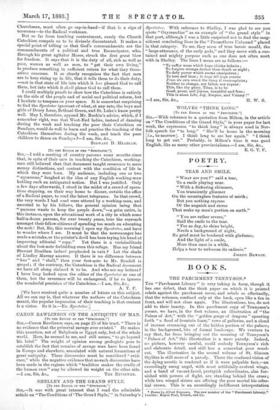[TO TEE EDITOR OF THE "SPECTATOR."]
&a,—T told a meeting of country parsons some months since that, in spite of their care in teaching the Catechism, working- men still believed that that document taught reverence to mere money distinctions, and content with the condition of life in which they were born. My audience, including one or two ." squarsons," laughed at the idea of any English working-man holding such an antiquated notion. But I was justified. Only • a few days afterwards, I stood in the midst of a crowd of opera- tives stopping, on their way home to dinner, outside the office -of a Radical paper, to read the latest telegrams. In that crowd, the very words I had used were uttered by a working-man, and assented to by his fellows, the general opinion being that " parsons wants to keep the people down,"—a grim satire, in this instance, upon the educational work of a city in which some `half-a-dozen parsons, for over twenty years, bore the reproach amongst their fellow-citizens of spending too much on educating the mob ! But, Sir, this morning I open my Spectator, and have to wonder where I am. It must be that the newsmonger has made a mistake, or the printer's devil has been trying his hand at improving editorial "copy." Yet there is a verisimilitude -about the foot-note forbidding even this refuge. Has my friend Stewart Headlam indeed prophesied in vain ? Let the shade -of Lindley Murray answer. If there is no difference between ' has" and "shall," then yonr foot-note to Mr. Rendell is gospel; if the contrary, the Catechism is the Radical document -we have all along claimed it to be. And who are my betters ? I have long looked upon the editor of the Spectator as one of them, but the reverence will be endangered, if he so ignores the wonderful precision of the Catechism.—I am, Sir, &c., A. T. F. [We have received quite a number of letters on this subject. All we can say is, that whatever the authors of the Catechism meant, the popular impression of their teaching is that content is a virtue. So it is.—En. Spectator.]


































 Previous page
Previous page